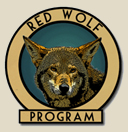Advancing Animal Management
More than a fun family attraction and educational destination, the WNC Nature Center participates in species management programs through the Association of Zoos and Aquariums and The US Fish and Wildlife Department. These programs help to establish viable populations and promote species survival.
North American River Otter
Since 2005, the WNC Nature Center has promoted a healthy and genetically diverse North American river otter population by  participating in AZA’s Population Management Plan program. This program studies current demographic and genetic status of river otters to ensure these creatures maintain a healthy balance with their habitat and human neighbors.
participating in AZA’s Population Management Plan program. This program studies current demographic and genetic status of river otters to ensure these creatures maintain a healthy balance with their habitat and human neighbors.
Cougar
Once found throughout Western North Carolina, the Eastern cougar is now absent in the wild of the Appalachian region. The WNC Nature Center participates in the cougar Population Management Plan program to ensure that these animals don’t disappear from their few remaining North American habitats.
The Red Wolf
In 1980, the red wolf was declared officially extinct in the wild. With only 250 captive red wolves currently in the United States, this species’ survival relies on programs like the AZA’s Species Survival Plan. As one of only 46 red wolf breeding sites, the WNC Nature Center is a crucial partner in this animal’s survival.
Beyond Our Center
Our commitment to good stewardship of wildlife doesn’t end at our front gate. From our herd of deer to our pair of playful otters, our animals serve as ambassadors for their wild counterparts. The WNC Nature Center helps protect the wildlife of the Southern Appalachians through collaborative programs to educate the public, conduct research, and support the protection of sensitive wildlife areas.
 FrogWatch USA
FrogWatch USA
FrogWatch USA is AZA’s flagship citizen science program that invites individuals and families to learn about the wetlands in their communities and help conserve amphibians by reporting the calls of local frogs and toads. For over ten years, volunteers have been trained to enter their FrogWatch USA information and ongoing analyses of these data have been used to help develop practical strategies for the conservation of these important species.
Frogs and toads are important—and in trouble! Frogs and toads are both predators and prey in aquatic and terrestrial food webs. They directly benefit humans by eating insects that can be pests and transmit diseases. Frogs and toads are sensitive to changes in their environment and are indicators of problems that can affect human health. Many previously abundant populations have experienced dramatic population declines—in the United States and around the world. It is essential that we understand the scope, scale, and cause of these declines.
Anyone can volunteer and WE NEED YOU! You do not have to be a frog or toad expert to make and important contribution! You need an interest in learning about frogs and toads, the commitment to learn and identify their distinct calls, and the ability to make several evening visits to a local wetland. You can be directly involved in gathering information that may help stop the decline of these important and treasured animals.
To get more information or become a volunteer:
1. Attend one of the WNC Nature Center’s new volunteer training sessions, offered each spring. Check the calendar or call us for upcoming dates.
2. Contact a WNC Nature Center FrogWatch Coordinator at [email protected] or [email protected]
3. Or visit: https://www.aza.org/frogwatch/
Our Own Backyard
When you visit the WNC Nature Center, you’ll see that we’re improving our own habitat as well as our animals’. We installed energy efficient hand dryers to cut down on paper waste, replaced our water faucets with low-flow ones, and installed CFL light bulbs. A 400-gallon rain catchment system provides water for irrigation of our landscaping. And our storm water wetland feature captures diverted storm water runoff from the exhibit buildings.
These nature resource conservation initiatives are part of the City of Asheville’s resolution to reduce its municipal carbon footprint 80% by the year 2050. Through these initiatives and more, we strive to improve the environment for all residents of WNC—human and animal.
For more on The City of Asheville's sustainability efforts click here.